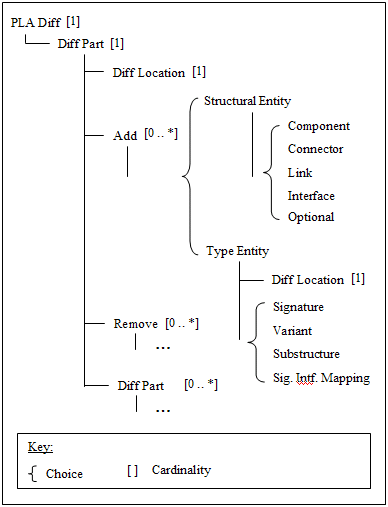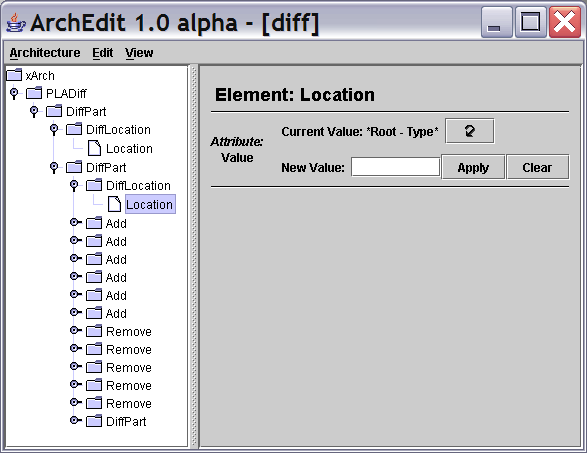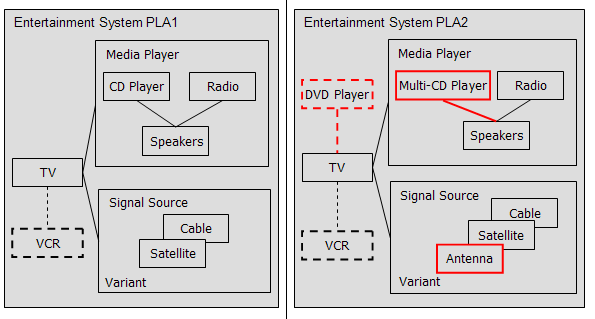Product Line Diff Document
The diff document is an xADL 2.0 file that is able to capture
the differences between architectures in terms of additions/removals of
architectural elements. The structure of the diff document is
determined by the PLA diff schema that can be found on the xADL 2.0 webpage.
Note the PLA diff schema differs from the normal diff schema in that it
captures fine-grained differences and hierarchical composition.
A simplified graphical view of the diff document structure is presented
below:

The root of the diff document is the PLADiff element which
must contain a
single DiffPart. DiffParts are the
main elements within the
diff document, they contain all the additions and removals. As
can be seen from the figure above, a DiffPart can also
contain 0 or more DiffParts. This embedding of DiffParts
allows us to capture the layering of substructure (architectural
hierarchy) that is possible within a xADL architecture. The DiffLocation
stores either the description of the component/connector instance (not
the actual type) or the boolean guard of the variant that has the
substructure. For the initial DiffPart, its DiffLocation
is set to the string *Root - Structure* if the initial starting
point was an ArchStructure or
the string *Root - Type* if the starting point was a type. Note
that if the starting point was a type,
the resulting diff document might have an initial DiffPart
with nothing but another DiffPart with the same DiffLocation
as the initial root location as shown below:

This is because the differencing process start at the type
level and
may not detect any differences until it has reach the substructure of
the type (if it has one).
Add element can either include an AddStructuralEntity
or an AddTypeEntity. The distinction between structural
and type entities are made because they reside in different parts of
the xADL document.
Structural entities reside within an ArchStructure
directly (e.g. Component) or can be found within
components/connectors/links (e.g. Optional - the
optionality guard for
optional components). Type entities on the other hand reside
within a component or connector type. All type entities also
contain a DiffLocation containing either the
description of the particular component/connector instance or the
boolean guard of the variant of the type where the difference was
detected. The structure of the Remove element
mirrors the structure of the Add element and thus is not
shown here for simplicity. The exact information contained in the
additions and removals are summarized in the table below:
| Element |
Addition |
Removal |
| Component |
1. Copy of
actual xADL component |
1. Description
of the component |
| Connector |
1. Copy of actual xADL connector | 1. Description of the connector |
| Link |
1. Copy of
actual xADL link 2. Description of the component/connector and its interface at both endpoints |
1. Description of the link |
| Interface |
1. Description
of the component/connector that contains this interface 2. Copy of actual xADL interface |
1. Description
of the component/connector that contains this interface 2. Description of the interface |
| Optional |
1. Description
of the component/connector that contains this optionality guard 2. Copy of actual xADL optionality guard |
1. Description
of the component/connector that contains this optionality guard 2. Description of the optionality guard (the boolean expression) |
| Signature |
1. Copy of actual xADL signature | 1. Description of the signature |
| Variant |
1. Copy of actual xADL variant | 1. Description of the variant (the boolean expression) |
| Signature
Interface Mapping |
1. Copy of
actual xADL signature interface mapping 2. Description of the outer component and its signature 3. Description of the inner component and its interface |
1. Description
of the outer component and its signature 2. Description of the inner component and its interface |
| Substructure |
1. Description of ArchStructure for this substructure | 1. N/A (only 1
substructure in a type) |
Example
This section presents a brief example of a diff document. Below is two different architectures to calculate the difference on, the one on the left is considered the base or original architecture whereas the one on the right is the new architecture.

The changes in the new architecture are highlighted in red. In
particular, it has a new optional component DVD Player, a new variant
Antenna, and replaced the original CD Player with a new Multi-CD Player (in
Media Player's substructure). The resulting diff document
(assuming the starting point is the Entertainment System component type) in
abbreviated non-XML notation is shown below:
PLADiff |
Additional questions about the PLA Diff Document should be sent to Ping H. Chen.
